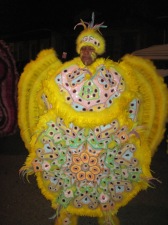Last year, a few days after St. Joseph’s Day, the New York Times ran a great article on the Mardi Gras Indians. Each will spend hundreds of hours and thousands of dollars to build a new suit each year. They will take part in Mardi Gras, St. Joseph’s night, and Super Sunday. They will make nothing for their efforts, while photographers transform images of their outfits into marketable books, calendars, posters and prints. At the time, the idea arose: what if the Indians sought copyright protection for the commercial use of their suits?
The idea was first floated by Ashlye M. Keaton, a lawyer who represents the Indians through two pro bono legal programs, Sweet Home New Orleans legal services, and the Entertainment Law Legal Assistance Project. The concept is simple: Indians should be able to keep others from profiting from their work. However, the devil is in the details. The legal strategy is questionable and the the ability to enforce it, more problematic.
And now, the Times-Picayune reports that some Indians will be putting it to the test this year. Keaton recognizes that costumes are not subject to copyright protection. So instead, Indians have been advised to consider their outfits as works of art, and as such, copyrightable.
It should be interesting to see how this plays out.
